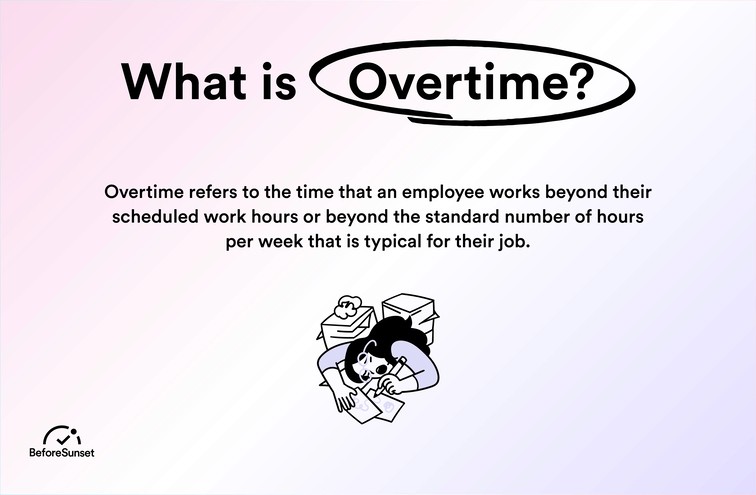Both your emotional and physical health may be negatively affected by putting in extra hours at work. You should track the amount of extra time you spend at work and ensure that you are compensated accordingly. The average amount of time spent working per week is 40 hours, or eight hours per day. Overtime refers to the additional hours performed above this time limit. Therefore, in order to understand what overtime is and act accordingly, it is crucial that you keep track of your time and effectively manage your work for both your overall output and your health. Let's dive deep into that!

What is Overtime?
Overtime refers to the time that an employee works beyond their scheduled work hours or beyond the standard number of hours per week that is typical for their job. Any hours worked by an employee over 40 in a week are considered overtime.
In most countries, employers are required to pay their employees a higher rate of pay for overtime work, to compensate for the extra time and effort being put in by the employee. Overtime can be a one-time occurrence or a regular part of an employee's work schedule.
Employers may require employees to work overtime for a variety of reasons, such as to meet increased demand for products or services, to meet deadlines, or to cover for absent employees. Some employees may choose to work overtime in order to earn additional income or to get ahead in their careers.
However, it is important for both employers and employees to be mindful of the potential negative consequences of excessive overtime, such as burnout, decreased productivity, and negative impacts on health and well-being.
Who is Eligible for Overtime Pay?
In the United States, overtime pay is required by federal law for certain employees who work more than 40 hours in a workweek. According to the Fair Labor Standards Act (FLSA), most hourly employees are eligible for overtime pay, but some salaried employees may also be eligible.
To be eligible for overtime pay, an employee must:
Be classified as a nonexempt employee: Non-exempt employees are eligible for overtime pay, whereas exempt workers are not. No matter what their job title is or what they do at work, nonexempt employees are entitled to overtime pay.
Work more than 40 hours in a workweek: Overtime pay is required for all hours worked over 40 hours in a workweek. The workweek can be any definite and regularly occurring period of 168 hours, or seven 24-hour periods in sequence.
Be paid on an hourly basis: Overtime pay is generally not required for salaried employees, although some salaried employees may be eligible for overtime pay if they meet certain criteria.
It's worth noting that some states have their own overtime laws that may provide additional protections or require overtime pay for employees who work more than a certain number of hours in a day or week. To find out if an employee is eligible for overtime pay, it's important to look at both federal and state laws.

The Requirements for Receiving Overtime Pay
Different countries and states have different rules about what an employee has to do to get overtime pay. However, some general requirements that are common in many countries include:
The employee must work more than a certain number of hours in a workweek, which is usually 40 hours in the United States.
The employee must be classified as a nonexempt employee, meaning they are eligible for overtime pay. Exempt employees, such as executives and managers, are typically not eligible for overtime pay.
The employee must be paid on an hourly basis and not on a salary basis.
The employee must be over the age of 18 (in some countries, the age may be different).
The employee must be working in a job that is not exempt from overtime laws, such as certain white-collar jobs or jobs in specific industries.
The employee must be paid at least the minimum wage for all hours worked, including overtime hours.
The employer must have the necessary policies and procedures in place to accurately track and pay overtime to eligible employees.
How Much Does an Employee Get Paid for Overtime Hours Worked?
The amount an employee gets paid for overtime hours worked is generally 1.5 times their regular hourly rate. There are different ways that overtime can be calculated and paid.
In some cases, overtime is paid at a rate of time and a half, which means that the employee is paid their regular hourly rate for the first 40 hours of work and then receives a rate of pay that is one and a half times their regular rate for any additional hours worked. Other systems may use a different multiplier, such as double time or even triple time, for overtime pay calculation.
For example, if an employee normally gets paid $20 per hour and works 2 hours of overtime, they would be paid $30 for those 2 overtime hours ($20 x 1.5 = $30). It is important to note that the overtime rate may vary depending on the laws and regulations in the employee's location and the specific terms of their employment contract.

What is Time and a Half?
Time and a half refer to a rate of pay that is one and a half times an employee's regular hourly rate. It is typically used as a form of overtime pay, to compensate employees for working beyond their normal work schedule or beyond a certain number of hours per week.
For example, if an employee normally earns $20 per hour and works overtime, they may be entitled to time and a half pay, which would be $30 per hour ($20 x 1.5). This means that for every hour of overtime that the employee works, they would receive $30 in pay, rather than their regular rate of $20 per hour.
The rules and regulations surrounding overtime pay, including time and a half, can vary depending on the country or region where the employee works, as well as the terms of their employment contract. It is important for both employers and employees to be aware of these rules in order to ensure that employees are properly compensated for their overtime work.
Working long hours can lead to increased stress and fatigue, which can negatively affect your mood and overall well-being. It can also lead to problems with sleep, as you may have less time to rest and relax.
What is Double Time Pay?
Double time pay is a higher rate of pay that an employer may be required to give an employee for working overtime. It is typically used in situations where an employee is required to work on a holiday or on a day that is normally outside of their workday. It also relies on companies' own agreements. Double time pay is typically calculated as twice the employee's regular hourly rate.
For example, if an employee normally earns $20 per hour and works on a holiday that is normally their day off, they would be entitled to double time pay of $40 per hour for those hours worked. The exact rules for when an employee is entitled to double time pay can vary depending on the laws and regulations in the region where the employee works, as well as the terms of their employment contract.
It is important for both employers and employees to be aware of the rules and regulations surrounding overtime pay and double time pay, as failure to properly compensate employees for their overtime work can result in legal action being taken against the employer.

Other Overtime Pay Regulations
Are There Any Other Overtime Pay Regulations and Overtime Rules that Employers Should be Aware of?
Yes, there are several other regulations related to overtime that employers should be aware of, including:
·The Fair Labor Standards Act (FLSA): This federal law sets standards for minimum wage, overtime pay, and child labor. It requires that nonexempt employees receive time and a half for any hours worked over 40 in a workweek.
·State overtime laws: Some states have their own overtime laws that may be more stringent than the FLSA. For example, California requires overtime pay for any hours worked over 8 in a day or 40 in a week, and only the state of California has a law that requires employers to pay employees double time.
·Collective bargaining agreements: If a company has a collective bargaining agreement with a union, it may outline different overtime rules than the FLSA or state laws.
·Overtime exemptions: Some employees may be exempt from overtime pay, such as salaried executives, administrators, and professionals. However, employers must carefully review the FLSA's exemption criteria to ensure that employees are classified correctly.

Negative Effects of Overworking
Working long hours can lead to a lack of motivation and physical activity as well as a bad diet, both of which can have a severe impact on a person's physical health. It is also possible for it to affect the personal relationships you have as well as your social life, which can result in feelings of loneliness and isolation.
If you want to keep your mental and physical health in decent shape, you should try to maintain a balance between the aspects of your life that involve work and the other parts of your life. Even if there are times when putting in extra hours at work is necessary, it is essential to ensure that you still find time to treat yourself and that your well-being is a top priority to keep yourself motivated for work at the same time.
Time management helps you keep your motivation, time, and money, and it would boost your motivation if you could see how much money you made for each hour you worked. With well-managed time, you can also give essential attention to yourself and your social life.
To strike a balance between your work and spare time and to manage them well, you can use our user-friendly work management tool Before Sunset to avoid missing sunsets due to overwork!


